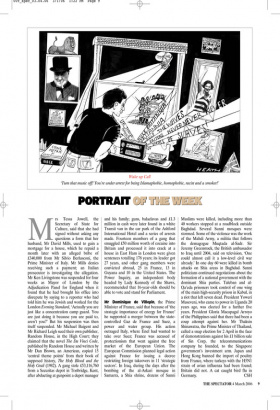PORTRAIT OF THE WEEK M rs Tessa Jowell, the Secretary of
State for Culture, said that she had signed without asking any questions a form that her husband, Mr David Mills, used to gain a mortgage for a house, which he repaid a month later with an alleged bribe of £340,000 from Mr Silvio Berlusconi, the Prime Minister of Italy. Mr Mills denies receiving such a payment; an Italian prosecutor is investigating the allegation. Mr Ken Livingstone was suspended for four weeks as Mayor of London by the Adjudication Panel for England when it found that he had brought his office into disrepute by saying to a reporter who had told him he was Jewish and worked for the London Evening Standard, ‘Actually you are just like a concentration camp guard. You are just doing it because you are paid to, aren’t you?’ But his suspension was then itself suspended. Mr Michael Baigent and Mr Richard Leigh sued their own publisher, Random House, in the High Court; they claimed that the novel The Da Vinci Code, published by Random House and written by Mr Dan Brown, an American, copied 15 ‘central theme points’ from their book of supposed history, The Holy Blood and the Holy Grail (1982). A gang stole £53,116,760 from a Securitas depot in Tonbridge, Kent, after abducting at gunpoint a depot manager and his family; guns, balaclavas and £1.3 million in cash were later found in a white Transit van in the car park of the Ashford International Hotel and a series of arrests made. Fourteen members of a gang that smuggled £50 million worth of cocaine into Britain and processed it into crack at a house in East Ham in London were given sentences totalling 178 years; its leader got 27 years, and other gang members were convicted abroad, 25 in France, 13 in Guyana and 10 in the United States. The Power Inquiry, an independent body headed by Lady Kennedy of the Shaws, recommended that 16-year-olds should be able to vote and stand for Parliament.
Mr Dominique de Villepin, the Prime Minister of France, said that because of ‘the strategic importance of energy for France’ he supported a merger between the statecontrolled Gaz de France and Suez, a power and water group. His action outraged Italy, where Enel had wanted to take over Suez; France was accused of protectionism that went against the free market of the European Union. The European Commission planned legal action against France for issuing a decree restricting foreign takeovers in 11 ‘strategic sectors’. In Iraq, during the days after the bombing of the al-Askari mosque in Samarra, a Shia shrine, dozens of Sunni Muslims were killed, including more than 40 workers stopped at a roadblock outside Baghdad. Several Sunni mosques were stormed. Some of the violence was the work of the Mahdi Army, a militia that follows the demagogue Muqtada al-Sadr. Sir Jeremy Greenstock, the British ambassador to Iraq until 2004, said on television, ‘One could almost call it a low-level civil war already.’ In one day 60 were killed in bomb attacks on Shia areas in Baghdad. Sunni politicians continued negotiations about the formation of a national government with the dominant Shia parties. Taleban and alQa’eda prisoners took control of one wing of the main high-security prison in Kabul, in a riot that left seven dead. President Yoweri Museveni, who came to power in Uganda 20 years ago, was elected for a further five years. President Gloria Macapagal Arroyo of the Philippines said that there had been a coup attempt against her. Mr Thaksin Shinawatra, the Prime Minister of Thailand, called a snap election for 2 April in the face of demonstrations against his £1 billion sale of Sin Corp, the telecommunications company he founded, to the Singapore government’s investment arm. Japan and Hong Kong banned the import of poultry from France, where turkeys with the H5N1 strain of avian influenza had been found; Britain did not. A cat caught bird flu in Germany. CSH










































































 Previous page
Previous page